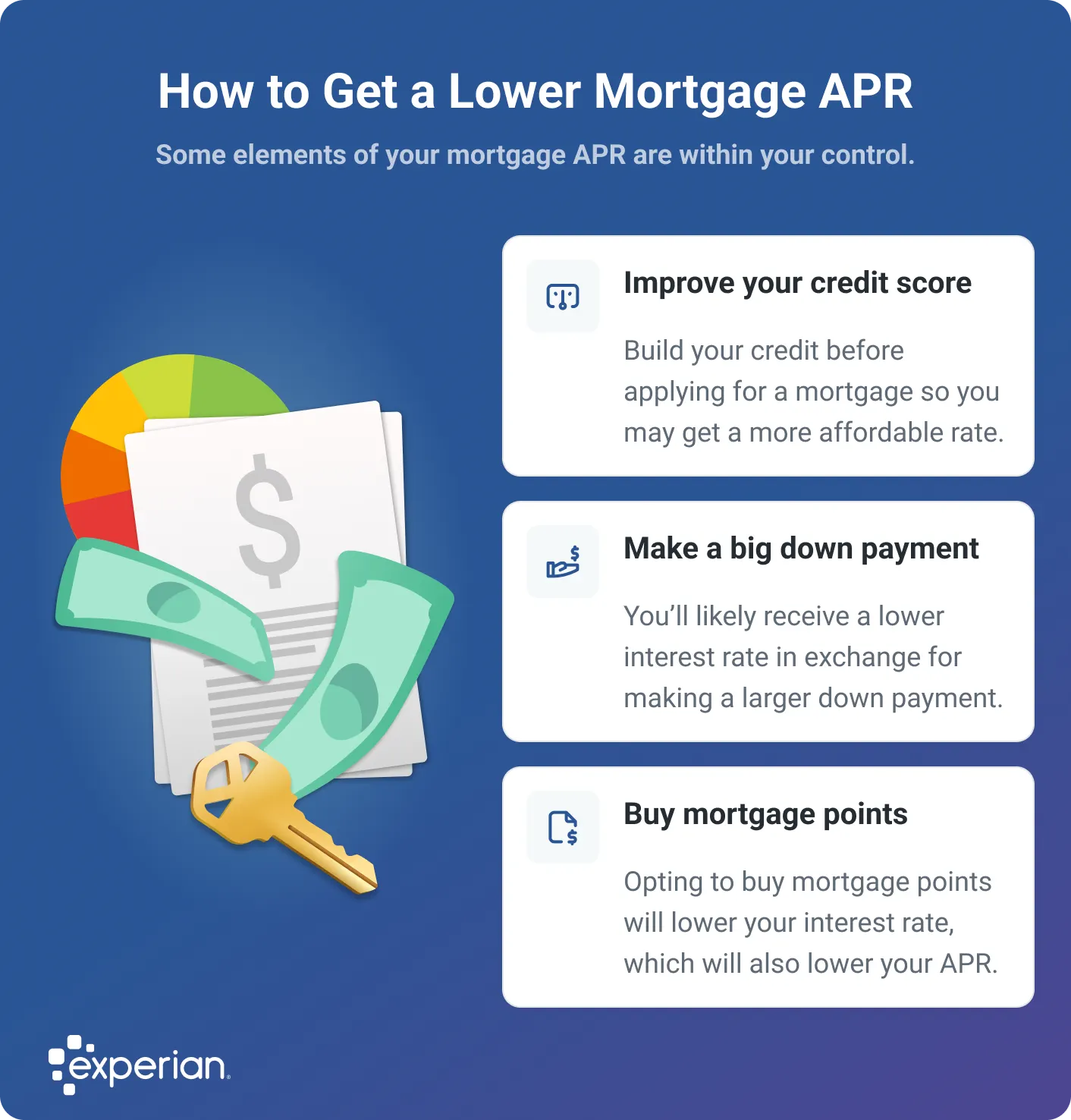What Is a Mortgage APR?
Quick Answer
A mortgage APR is the total cost of taking out a home loan. It includes the interest rate, which lenders charge in exchange for borrowing money, plus extra costs specific to a mortgage.

A mortgage APR is a comprehensive indicator of your mortgage's cost to you. It includes not just the interest rate as determined by your lender, but also fees, closing costs and discount points you paid to get the loan.
Both the interest rate and APR show your annual cost of borrowing. But a mortgage APR is more accurate, and will typically be higher than the interest rate, since it takes into account additional charges. Your monthly payment, however, is calculated based on your interest rate, not the APR.
Here's what a mortgage APR includes and how to minimize how much you could pay.
What Is a Mortgage APR?
A mortgage APR, or annual percentage rate, is the total cost of taking out a home loan. It includes the interest rate, which lenders charge in exchange for borrowing money, plus extra costs specific to a mortgage. The APR is a better gauge than the interest rate of how much you'll actually pay when you borrow money. Other installment loans, such as car loans, student loans and personal loans, also generally have both an interest rate and a more comprehensive APR.
You're required by law to receive a loan estimate from your lender within three business days after applying for a mortgage. You'll see your interest rate on page one of this form and your APR on page three.
Tip: The Consumer Financial Protection Bureau (CFPB) offers a sample loan estimate to explore so you'll know where to find key loan details.
Compare mortgage rates
Check today’s rates to find the best loan offers. Staying updated on current rates helps you secure a competitive mortgage and save more over time.
What Fees Does a Mortgage APR Include?
A mortgage APR includes the following fees and charges, which are all typically part of your closing costs. These are the fees that you pay when closing on your home and officially becoming a homeowner. They add to the overall cost of the loan, and some are therefore reflected in your APR. Closing costs in total usually add up to 2% to 5% of the home's price.
- Loan origination fees: A mortgage origination fee is typically 0.5% to 1% of the loan amount. The origination fee may include other charges, like application fees, depending on the lender's policies.
- Broker fees: If you use a mortgage broker, they generally charge a commission of 1% to 2% of the loan amount. You'll often find that the seller pays this commission, but if your loan agreement specifies that the buyer pays, then it could be included in your APR.
- Mortgage insurance: Depending on the down payment you made and the type of loan you took out, the lender may charge mortgage insurance to reduce the risk that you'll fall behind on payments. The cost of mortgage insurance varies by the type of mortgage you get, with fees ranging from 0.15% to 3.3% of the loan amount.
- Mortgage points: You can buy mortgage points to lower your interest rate. Mortgage points are, in essence, prepaid interest, and while it's common to pay for them at closing, you may also be able to add them to your loan amount and pay for them over time. If you pay them in full upfront, the points will lower your APR. One mortgage point typically costs 1% of your loan amount. Calculate whether buying points is worth it based on how long you plan to stay in the home.
| Fee Type | Fee Amount |
|---|---|
| Loan origination fees | 0.5% to 1% |
| Broker fees | 1% to 2% |
| Mortgage insurance | 0.15% to 3.3%, depending on the type of mortgage |
| Mortgage points | 1% |
Mortgage APR vs. Interest Rate
Interest is the fee a lender charges you to borrow money, and you'll pay it as you pay down your principal balance as part of the monthly mortgage payment. Mortgage lenders determine your mortgage interest rate according to your credit score, the size of your loan, the down payment, the length of your repayment term and current mortgage rates, among other factors.
Mortgage APR, on the other hand, includes your interest rate as well as other costs and fees. You'll see it included in your loan estimate for informational purposes, to help you understand how much on top of your principal balance you'll pay to buy a home.
Learn more: Why Is My Mortgage APR Higher Than the Interest Rate?
How to Calculate Your Mortgage APR
You can use an APR calculator to estimate your total payment including finance charges at any point during the mortgage process. To do so, take the following steps:
- Find your principal balance. Start with the loan amount—for example, if the home cost $300,000 and you made a down payment of $50,000, that means your loan amount is $250,000.
- Add your finance charges. Find your interest rate and all fees, such as the origination fee, broker fee and other closing costs, and add them together. Certain closing costs, like the appraisal fee, may not be incorporated in the APR. Double-check with the lender to understand what they're including in the APR. In our example, your interest rate could be 6.75% for a 30-year loan and your additional finance charges could total $9,000, or 3% of the home's price.
- Subtract any discount points. If you're buying mortgage points, they'll lower your interest rate. Generally, you'll pay 1% of the principal balance to cut your interest rate by 0.25%. For example, paying $5,000 on a $250,000 loan (two mortgage points) would lower your interest rate from 6.75% to 6.25%.
- Use an APR calculator. Now, use a calculator to determine your APR. In this example, your APR would be 6.59%, compared with an interest rate of 6.25% after paying the two discount points.
Mortgage calculator
How to Get a Lower Mortgage APR
Some elements of your mortgage APR are within your control. Try these strategies to lower it:
- Improve your credit score. According to an Experian analysis, there's a 0.82 percentage point spread between the average 30-year conventional mortgage rate for those with a FICO® ScoreΘ of 780 and those with a score of 620. That means having a score of 780 could mean paying $157 per month less on your mortgage payment than if you had a score of 620. Build your credit before applying for a mortgage so that your creditworthiness gets you an affordable interest rate.
- Make a bigger down payment. You'll likely receive a lower interest rate in exchange for making a larger down payment. Lenders view this as a way of mitigating the risk you won't be able to pay your mortgage. You can also steer clear of mortgage insurance if you put a large amount down, further limiting your APR.
- Buy mortgage points. Opting to buy mortgage points will lower your interest rate, which will also lower your APR. But mortgage points aren't always a slam dunk. If you move or refinance before you recoup the amount you paid, points will be a costly choice. Also, you may need the money you'd put toward points for an emergency fund or to pay for the costs of home ownership, like repairs and higher utility bills.
Learn more: Can You Negotiate Mortgage Rates?

Frequently Asked Questions
The Bottom Line
Your mortgage APR tells a more detailed story of how much you'll pay to borrow money than the interest rate. But the interest rate is what helps determine your monthly payment, not the APR. To fully understand the impact of taking out a mortgage, look at both numbers—and when comparing lenders, double-check which charges the APR incorporates, and how decisions like buying mortgage points could impact it.
Improving your credit is one way to secure as low an interest rate, and APR, as is feasible. Check your FICO® Score before applying for a mortgage so that you can make a plan to strengthen it.
Curious about your mortgage options?
Explore personalized solutions from multiple lenders and make informed decisions about your home financing. Leverage expert advice to see if you can save thousands of dollars.
Learn moreAbout the author
Brianna McGurran is a freelance journalist and writing teacher based in Brooklyn, New York. Most recently, she was a staff writer and spokesperson at the personal finance website NerdWallet, where she wrote "Ask Brianna," a financial advice column syndicated by the Associated Press.
Read more from Brianna